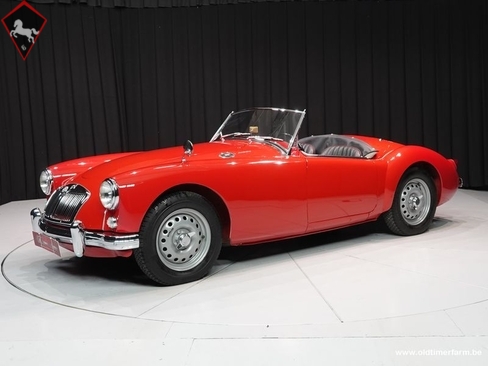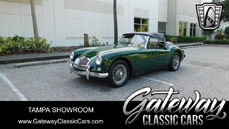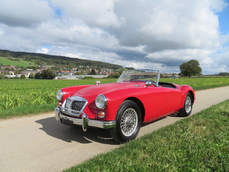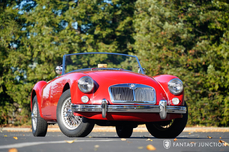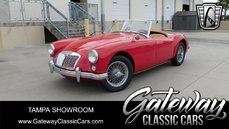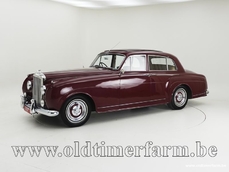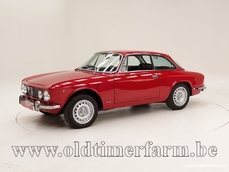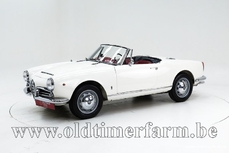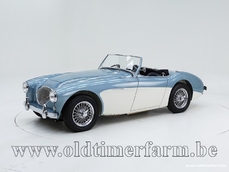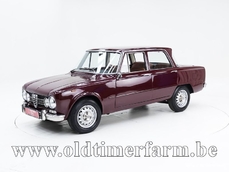MG MGA Twin Cam '59 1959
Allgemeine Beschreibung :
Lowered price from span class="pq6dq46d tbxw36s4 knj5qynh kvgmc6g5 ditlmg2l oygrvhab nvdbi5me sf5mxxl7 gl3lb2sf hhz5lgdu">img src="https://static.xx.fbcdn.net/images/emoji.php/v9/t33/1/16/2705.png" alt="?" width="16" height="16" /> €56.950- €51.950 span class="pq6dq46d tbxw36s4 knj5qynh kvgmc6g5 ditlmg2l oygrvhab nvdbi5me sf5mxxl7 gl3lb2sf hhz5lgdu">img src="https://static.xx.fbcdn.net/images/emoji.php/v9/t33/1/16/2705.png" alt="?" width="16" height="16" /> The MGA was produced from 1955 to 1962. The MGA replaced the older T-type cars and represented a complete styling break from the older vehicles. The car was officially launched at the Frankfurt Motor Show of 1955. It was replaced by the MGB when production ceased in July 1962. Through that time, BMC sold 101,081 units, the vast majority of which were exported with only 5869 cars sold on the home market, the highest export percentage of any British car. The design dates back to 1952 when MG designer Syd Enever created a streamlined body for George Philips' TD Le Mans car. The problem with this car was the high seating position of the driver because of the limitations of using the TD chassis. A new chassis was designed with the side members further apart and the floor attached to the bottom rather than the top of the frame sections. A prototype was built and shown to the BMC chairman Leonard Lord. Lord turned down the idea of producing the new car as he had just signed a deal with Donald Healey to produce Austin-Healey cars two weeks before. Falling sales of the traditional MG models caused a change of mind and the car, initially to be called the UA-series, was brought back. As it was so different from the older MG models it was called the MGA, the "first of a new line" to quote the contemporary advertising. There was also a new engine available so the car did not have the originally intended XPAG unit but was fitted with the BMC corporate B-Series type allowing a lower bonnet line. It was a body-on-frame design and used the straight-4 "B series" engine from the MG Magnette saloon driving the rear wheels through a 4 speed gearbox. Suspension was independent with coil springs and wishbones at the front and a rigid axle with semi-elliptic springs at the rear. Steering was by rack and pinion and was not power assisted. In May 1959 the standard cars also received an updated engine, now at 1588 cc producing 78 bhp (58 kW; 79 PS) . Front discs were fitted, but drums remained in the rear. 31,501 were produced in less than three years.[2] Externally the car is very similar to the 1500 with differences including: Amber or white (depending on market) front turn indicators shared with white parking lamps, separate stop/tail and turn lamps in the rear, and 1600 badging on the boot and the cowl. A number of 1600 De Luxe versions were produced with leftover special wheels and four wheel disc brakes of the departed Twin-Cam, or using complete modified Twincam chassis left redundant by the discontinuance of that model. Seventy roadsters and 12 coupés were built. Specifications Bodywork Length : cm (in): 396 (156) Width : cm (in): 145 (57.2) Height : cm (in): 127 (50) Wheelbase : cm (in) : 239 (94) Weight: kg (lb) : 900 (1986) Mechanics. Displacement : straight 4 1588 cc (96 ci), front mounted Valve gear : 8 Fuel system : 2 SU carburettors Gearbox : 4 speed manual Drive wheels : rear wheel drive Maximum power : 108 bhp at 6700 rpm Maximum torque : 142 Nm at 4500 rpm Maximum speed : 183 km/h (114 mph)
1959 MG MGA Twin Cam '59 is listed zu verkaufen on ClassicDigest in Aalter by Oldtimerfarm for €51950.
Fakten der Auto
Karosserietyp : Auto Marke : MG Modell : MGA Ausführung : Twin Cam '59 Hubraum : 0.0 Modelljahr : 1959 Lage : Aalter Fahrzeug Anmeldung : Undefiniert
51950 €
People who viewed this MG MGA also viewed similar MG listed at ClassicDigest
Other cars listed for sale by this dealer
über MG
Die Geschichte von MG (Morris Garages) ist ein reiches Geflecht, das mehrere Jahrzehnte umspannt und verschiedene Besitzer sowie Unternehmensstrukturen einbezieht. Hier ist eine Übersicht über die MG-Geschichte von ihrer Gründung bis zur schwierigen Phase unter der British Leyland (BL) Corporation, wobei wichtige Modelle und ihre Spezifikationen hervorgehoben werden:1. Gründung und frühe Jahre:
Gründungsjahr: 1924
Gründer: Cecil Kimber
Anfänglicher Fokus: Karosseriebau und Anpassung von Morris-Autos.
2. MG-Oktogon-Logo:
Das ikonische MG-Oktogon-Logo wurde eingeführt und repräsentiert die Fusion von MG mit Morris.
3. MG M-Type Midget (1929–1932):
Wichtige Merkmale:
Kompakter Zweisitzer.
Angetrieben von einem 0,8-Liter-Motor.
Der Beginn der Midget-Serie.
4. MG T-Series (1936–1955):
Wichtige Modelle:
MG TA, TB, TC, TD, TF
Wichtige Merkmale:
Roadster mit klassischem Design.
Erfolg im Motorsport, insbesondere in der Zeit vor und nach dem Zweiten Weltkrieg.
5. Nachkriegszeit und MG A (1955–1962):
Wichtige Merkmale:
Abkehr vom traditionellen Design.
Erster MG mit einem stromlinienförmigen, modernen Design.
Erhältlich als Roadster oder Coupé.
Angetrieben von einem 1,5-Liter-Motor.
6. MG B (1962–1980):
Wichtige Merkmale:
Klassisches Design britischer Sportwagen.
Erhältlich als Roadster oder GT-Coupé.
In großen Stückzahlen produziert.
Varianten inklusive des leistungsstarken MGC.
7. MG Midget (1961–1979):
Wichtige Merkmale:
Kompakter Sportwagen auf Basis des Austin-Healey Sprite.
Erschwinglich und beliebt.
Verschiedene Iterationen mit Motor-Upgrades.
8. MG C (1967–1969):
Wichtige Merkmale:
Eine leistungsstärkere Version des MGB mit einem 2,9-Liter-Reihensechszylinder.
Begrenzte Produktion.
9. Ära der BL Corporation (1968–1980):
Übernahme durch British Leyland (BL):
MG wurde Teil des größeren Konzerns British Leyland.
Schwierigkeiten bei der Qualitätskontrolle und Arbeitskonflikte.
Rückgang der Produktqualität und des Rufes.
10. MG MGB GT V8 (1973–1976):
Wichtige Merkmale:
Einführung eines werkseitig produzierten MGB mit einem V8-Motor.
Versuch, während schwieriger Zeiten Leistung in die Modellpalette einzuführen.
11. MG RV8 (1992–1995):
Wichtige Merkmale:
Begrenzte Produktion des Cabrios.
Wiederbelebungsversuch durch die Rover Group (Nachfolger von BL), um den klassischen MG-Geist wiederzubeleben.
Die MG-Geschichte während der Ära von British Leyland markierte eine schwierige Phase mit einem Rückgang von Qualität und Ruf. Dennoch bleibt die Marke weiterhin mit klassischen britischen Sportwagen verbunden.
